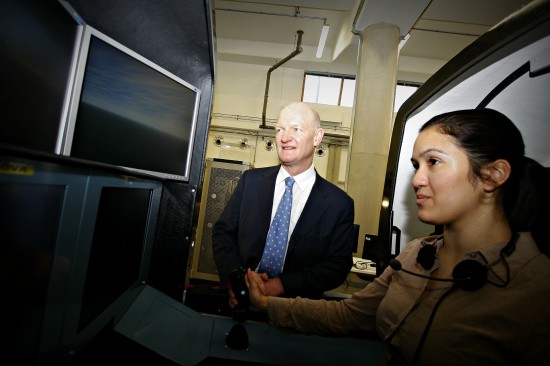Press release: Coventry University in multimillion pound manufacturing boost using games technology
SWINTON, UK — Coventry University’s Serious Games Institute is set to play a leading role in a £1.5 million (US $2.3 million) research project which aims to help manufacturing firms transform their business models using games technology.
The project, announced on Thursday by universities and science minister David Willetts shortly after he visited the University’s campus, is part of a wider £45 million funding package from the Engineering and Physical Sciences Research Council (EPSRC) designed to improve manufacturing competitiveness in the UK.

Coventry’s Serious Games Institute (SGI) will work with Aston University and the University of Sheffield on the gaming technology initiative, whose goal will be to encourage UK firms to use ‘gamification’ to sell services as well as products.
The research team will create serious games using three dimensional virtual worlds which can represent and handle the complex data systems of companies looking to adopt product service systems.
A host of industry partners – including Ford Motor Company, MAN Truck & Bus and Birmingham Science Park – will test out the games as part of the project.
Mr Willetts visited Coventry University on Thursday to meet with Vice-chancellor Professor Madeleine Atkins and see the latest technologies available to staff and students in the new £55m engineering and computing facility.
Speaking before the government’s Manufacturing Summit on Thursday, Mr Willetts said:
“The UK has a proud history of manufacturing but to build on this success industry needs access to the very latest science and technology. This £45 million package of investment will see our world-class research base investigating innovative new manufacturing equipment and techniques. This will support our industrial strategy in a range of important sectors, driving growth and keeping the UK ahead in the global race.â€
Coventry University’s Professor Sara de Freitas, director of SGI and of the Serious Games and Virtual Worlds Applied Research Group at the University.
 “To be chosen to lead this project in partnership with Aston University and the University of Sheffield represents an excellent opportunity, particularly for the West Midlands region which is now positioned very much as a global leader in the serious games industry,” said Coventry University’s Professor Sara de Freitas, director of SGI and of the Serious Games and Virtual Worlds Applied Research Group at the University. “The announcement of the EPSRC’s investment in research into applied games technology is fantastic news, and for Coventry University and its Serious Games Institute the project marks a significant milestone in our efforts to work with more businesses to help them take advantage of what is fast becoming an essential way to boost growth potential.â€
“To be chosen to lead this project in partnership with Aston University and the University of Sheffield represents an excellent opportunity, particularly for the West Midlands region which is now positioned very much as a global leader in the serious games industry,” said Coventry University’s Professor Sara de Freitas, director of SGI and of the Serious Games and Virtual Worlds Applied Research Group at the University. “The announcement of the EPSRC’s investment in research into applied games technology is fantastic news, and for Coventry University and its Serious Games Institute the project marks a significant milestone in our efforts to work with more businesses to help them take advantage of what is fast becoming an essential way to boost growth potential.â€
The gaming technology project is one of six ICT research programmes that have been awarded funding from the EPSRC, with others focusing on concepts such as cloud computing, crowdsourcing, ICT dashboards and platforms to provide new ways to develop, design and manage manufacturing.
Three quarters of worldwide wealth is created through providing services, so helping manufacturers compete in this way is seen as a huge opportunity, a competitive advantage and key to manufacturing success in the UK.
For more information on the projects, visit www.epsrc.ac.uk.
About EPSRC
The Engineering and Physical Sciences Research Council is the UK’s main agency for funding research in engineering and the physical sciences. EPSRC invests around £800 million a year in research and postgraduate training, to help the nation handle the next generation of technological change. The areas covered range from information technology to structural engineering, and mathematics to materials science. This research forms the basis for future economic development in the UK and improvements for everyone’s health, lifestyle and culture. EPSRC works alongside other Research Councils with responsibility for other areas of research. The Research Councils work collectively on issues of common concern via Research Councils UK.
- Storylink Radio Brings Interactive Storytelling to the Opensim World’s Fair - February 7, 2025
- Breaking news: Philip Rosedale to speak at OSCC on Sunday - December 7, 2024
- Registration now open for December’s OpenSim Community Conference - November 13, 2024
